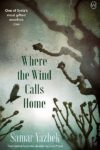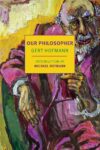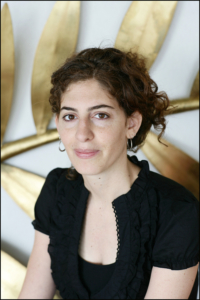
In When I Saw You, the second feature film from critically acclaimed director Annemarie Jacir, we return to Jordan in 1967. It’s a world that we often find hard to remember — one that has the confidence and optimism to imagine things differently, from the perspective of human equality. However, it’s also a world that we cannot forget, as it marks the roads not taken and hardening of political realities that persist into the present. The film follows a young boy named Tarek and his mother Ghaydaa, who arrive at the Harir refugee camp fully expecting it to live up to its “temporary” status. However, when no one can answer Tarek’s question, “If we walked here, why can’t we just walk back?”, he sets off on his own, eventually falling in with a group of fighters in the forest and never relenting on his simple mission. When I Saw You is about the big and the small, how sometimes the simplest questions are also the most logical.
When I Saw You was the Palestinian nomination for the 2013 Best Foreign Language Film Academy Award. Jacir is the director of one previous feature, Salt of This Sea, and many short films that have garnered acclaim and screened at festivals including Cannes, Toronto, and Amiens. She is also an accomplished writer and advocate for the development of independent Arab cinema. I spoke with Annemarie the night after her film made its New York premier at MOMA. We talked about the distinctiveness of 1967, the challenge of telling this story from the perspective of a child, and how Palestinian cinema fits within the wider world of Arab filmmaking.
Michael Schapira: Did you stay for the screening last night?
Annemarie Jacir: Usually I don’t. I can’t stand watching the film anymore, but last night I stayed in for about a half hour after the introductions. I was curious to get a feel for the crowd and see when they laugh and when they don’t laugh, and it was really nice how that crowd responded. It was a loud crowd. Not all audiences pick up on the lighter aspects of the film. Palestinian humor in general can be a little deadpan and black, not like the Egyptian over-the-top humor, so sometimes people don’t get it. But I think there were a lot of Palestinians in the crowd last night, and they got it.
Is it different showing the film at a place like MOMA as opposed to a film festival?
Yeah, which is nice. People were generous in a way that is different than a festival crowd. They wanted to talk about the politics and the history, whereas at a film festival people are more interested in things like what I shot on, which is fine. I know there are filmmakers who don’t like to talk about history or politics when they show their work and want to concentrate only on cinema. But last night the audience definitely wanted to talk about history and politics.
The politics of your two feature films are a little different — or at least the political education that the protagonists receive is different. In Salt of This Sea, Soraya is politicized very quickly as she enters and moves around the Palestinian territories, witnessing daily humiliations and experiencing them herself. In When I Saw You Tarek spends a good bulk of the film with fedayeen, but he is never subject to anything like a political education and the fighters rarely talk politics. Why did you decide to approach these characters differently?
Soraya and Tarek have something in common, which is their stubbornness. I met so many Sorayas in Palestine — mostly women, some men, but mostly Palestinian women — who had grown up in the U.S. or Europe. They were children of refugees who had gone back to Palestine and decided to live there. They just packed up all their things in their 20s or 30s and moved. I was interested by this kind of person whose parents had not even lived there, yet they came back and felt comfortable even as they were both part of and not part of Palestine. Soraya is Palestinian and she’s so absolutely a New York girl. She’s both and they don’t contradict each other — they are equally who she is and one doesn’t X out the other.
Soraya comes with already made decisions; she comes with an agenda. She arrives knowing that her grandfather’s bank account was frozen, and that the bank exists in Ramallah. She also knows all her history in an obsessive way. When Emad tells her about the village he’s from she knows there was a massacre there. None of this history is in the movie but she knows it all.
This time I wanted to do something really different. Tarek doesn’t come with anything. By circumstance he and his mother are thrown into this political situation that they never asked for. I wanted to keep Tarek logical, childlike, and basic, where he doesn’t fully get what’s happening. But because of that he rejects being a refugee. He keeps asking, “If we walked from point A to point B, why can’t we just walk back?” He doesn’t get any answers to the question so he decides to walk himself. I wanted to keep it that simple, in terms of the Palestinian right of return — it was what the right of return was for Tarek and remains today. It’s been complicated in the media and by the negotiations, but it is that basic, so I liked the idea of having it told from this simple point of view, where he is actually asking the right questions.
Did Mahmoud [Asfa, the actor who played Tarek,] know anything about the history, about ’67?
No, he didn’t know anything about it. I never gave Mahmoud the script — actually, I did that with all the actors in this film. They were only given their scenes, and only a day or two before we shot. But Tarek, Mahmoud, was never given any scenes. He’s a child and not experienced as an actor, and I wanted him to be in the moment, for each scene to play with what was happening at the moment, not knowing what was to come next.
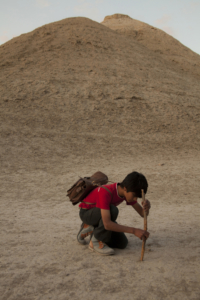
He retains such a buoyancy throughout the film.
I think I’m lucky. He’s special and a really cool kid. I think I realized that when we shot with the other kids in the school. Some of them could be really impatient and annoying, but he’s not that kind of kid. In that way he’s like Tarek. He doesn’t understand he’s a kid. In his mind he’s one of us. He has that maturity, but he also holds on to his childishness so he doesn’t feel insecure about being silly, which is really cool.
Just to give an example of his personality, he had a crush on the make-up girl on set. She was maybe 30, but in his mind they were having a relationship. Once we were all sitting around and she did some weird “Tarek,” and waved at him — she was a bit cutesy — and he looked at her and continued talking to whomever. Five minutes later he came up to her and said, “Can I talk to you for a minute?” He took her off to the side and said, “You see me sitting with the men and you’re sitting with the women, and that kind of thing you did makes me feel uncomfortable. I don’t mind when we’re alone, but don’t do that in front of people.” She was like, “Oh my god, it’s like I’m in a relationship with this kid.”
When you were conceiving the film, did you think that it might be too risky to put so much responsibility on Tarek? What if you didn’t find the right actor?
Sure, even after I cast him. I was sure he was the right person, I dreamt about him, but then I said, Shit, this is not good because I don’t want to feel that he’s such the right person that if he’s not it would be such a crushing disappointment. It’s a huge thing that he’s carried off. It’s risky, and it’s an expensive risk when you are working on a film. That’s why I spent so much time with him prepping for the role and building his character. I also had to establish his relationship to the woman who plays his mother [Ruba Blal], so I’d send them off to go shopping together, to do this or that or hang out in the park for the afternoon — so on a personal level they would have that mother-son relationship. And they really did.
Ruba was helpful because she is a trained actress and knew what needed to be done. I think between a director and an actress we created another world where we could play make believe. He was into it so much that he basically started to do method acting. At one point he came up to me and said, “I don’t want you to call me Mahmoud anymore. I just want to be called Tarek and I want everyone on the set to call me Tarek.” So he decided he was only going to be this person for this time period. His mother came up to me and said, “I don’t know what to do with him. He’s moody, he sits at home, and he makes me call him Tarek.”
I guess you just have to tell her, “Don’t worry, you’ll get him back in a few months.”
Yeah, or I hope I haven’t somehow screwed up your son! [Laughs.]
In Salt of This Sea the big historical rupture for Soraya’s family was 1948, when her grandfather was forced to leave Jaffa. The rupture in When I Saw You is 1967, which has different historical valences. It is this moment of internationalism, of Third World Liberation, so you see the fighters reading Mao’s Little Red Book and quoting socialist figures.
That is one of the things that I like about that moment; that people didn’t feel isolated, that leftist movements really saw themselves as one. It was comprised of young people, older people, too, but they believed they were all connected because it was about human equality. That was the basis for all that they were doing. As we know, things have really gone off track, not just with Palestinians but with all movements. What I wanted to do was pay homage to this moment, but at and the same time criticize where it goes.
I never go beyond ’67 in the film. We know what happens next, but that’s another story. Not to be nostalgic about the ’60s, but the hope that existed then is I think still possible and we should always strive for it. I’m very moved by people that I know who have led the most difficult lives — have been in prison, severely tortured — who are full of that hope. I don’t consider hopefulness to be a naïve thing or just for the young and the idealistic. The people I respect the most are people that have survived some stuff and they have this hope — that is what they have found.
There is also a gender equality that you see in the film. For example, you see Tarek’s mother being able to fall in with the fighters in a way that you wouldn’t expect. Is this more natural gender equality another aspect of the ’67 moment that you wanted to capture?
Yeah, it definitely was, because that’s not in the refugee camp. She’s uptight in the camp because she has to be. She’s a single mother, and you see her hair is always tied back in the same way. By the last scene her hair is totally down. In the film her hair becomes looser and looser and she’s suddenly in an atmosphere where men and women are mixing together and not judging her, which was happening at the time. But it’s also confusing to her. Is Layth [one of the fighters] flirting with her? I wanted to have these things happen that couldn’t happen in the camp, where she always has to be kind of harsh. But you see her laugh with the fighters.
You see her smoke, too.
And smoking publicly. There is a scene in the camp where she smokes, but Tarek is asleep and she is alone. I talked to a lot of Arab women who said at that time they would smoke privately, but never in public — socially, it meant something else to smoke in public.
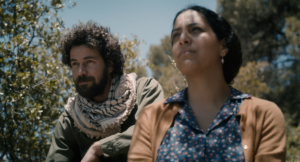
Beyond hopefulness the movie also captures that swinging sixties feeling and has a great soundtrack. What kind of research did you do to get a feel for the period?
Definitely tracked down a lot of music. I made the producer crazy because I was bugging people who were really into music and [who were] around at that period, and asking what they used to listen to. I interviewed Leila Khaled, who is best known for having hijacked airplanes. But I didn’t ask her anything about hijacked planes. I asked her what kinds of cigarettes she was smoking, what music she was listening to, if she had a crush on anybody.
With the music we had to find these record labels that don’t exist anymore. We should put out a soundtrack. The labels don’t exist anymore, but the rights were passed from place to place and it took about a year to secure all the music. There was one well-known song by the Rolling Stones that I wanted to use because, as I was saying, I wanted it to be about East and West, with a very traditional Arabic song and the Rolling Stones, which people were also listening to. But we couldn’t afford the Rolling Stones. They wanted like $150,000 for two minutes and I said “this is a low budget film,” and they said, “this is our low budget price.” But then I discovered this Cat Stevens song and he donated it to the film.
What other materials were you looking at?
Some produced films and documentaries, newsreels, and a lot of photography. When Tarek and Akram [the commander of the fighters] are marching away from the camera during this military exercise, that is from some still images that I came upon. The fighters and the refugees were really well photographed by journalists and news agencies. The fighters were becoming these international stars and there is a lot of material about them. So there were shots from photographs that I really liked and I was just animating them.
The movie made me think of Genet’s Prisoner of Love.
It’s referenced in the film. For example, in the scene where the fighters are giving Tarek his first shave — Jean Genet talks about watching the fighters shave. There are lots of small things like that. When you have the guys insulting each other across the hills, Genet has a passage on that.
Genet painted a very romantic portrait of the fighters, as you do to some extent. People are very skeptical of this today. Have viewers challenged you on this?
Yeah, for lots of people it’s not a cool thing to do. But you have to give your audience credit. Yes, things went really bad. Black September is right around the corner, but we know all that. That’s what I mean when I talked about wanting to stay in 1967. There was a sweet side to that moment and that is what I wanted the film to be about, because it is from Tarek’s point of view. We hear the fighters arguing, we hear that there is a war going on and there is the constant sound of warplanes, but we don’t see them. We see Tarek smashing ants or playing with little bullet casings and acorns. We stay in his perspective, and see things the way he does. It’s not a documentary and it’s not just about the movement. It’s about two humans, a mother and a son, who are put in a political context — and seeing how they deal with it. That is the main story.
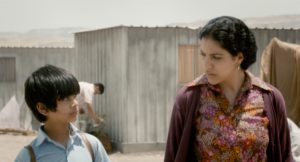
You’ve talked about the importance of moving away from European funding for your movies and for Arab cinema in general. Can you say a little more about this?
Salt of This Sea was entirely European funded. No Arabs would fund that film, and believe me, I tried. It was entirely European funded, but there was no artistic compromise that was made. I had complete freedom, and my French producers really protected that. I know that not all films have that, but thank god I did because I don’t think I’d ever be able to work another way. But this also meant that I had to work with crewmembers who had a Belgian or Swiss passport, so sometimes there were conditions that were hard to deal with.
The reason that I pushed for When I Saw You to have Palestinian producers and Arab funders is that it’s ridiculous that Arab filmmakers have to keep looking to Europe to make films. I know it’s difficult, but we have to insist on independence and our own community has to support our work. They have the money. I got funding from Abu Dhabi and they definitely have money. I think that shift is happening. We respect the art of other communities, but we need to respect our own art as well.
Is that shift related to the Arab Spring? So much of this recent history is told in terms of politics and social movements, but is there some aspect of it that we are missing on the level of cultural production?
I guess so. I think they are related. This film was written way before the Arab Spring, then we started shooting when it was all happening, so it’s not about the Arab Spring in any way. But at the same time why I wrote the story is the same reason why people in other countries protested, burned themselves, and reacted in the way that they did. When people need change they do something about it in different ways, whether they are factory workers or writers, they had their own way of expressing it, and something had to break.
Is Palestinian filmmaking different in many ways from other Arab cinema because of its limitations?
How do you mean?
Because they have limited resources, so they don’t have big production apparatuses, but also that there are limitations on how freely they can move about.
Not to support obstacles, but for me I think Palestinian filmmaking is really good because you have to find your way through a difficult situation. You have to think about what you are doing and why you are doing it because it’s not easy to do. You wouldn’t choose to do it, because you age 50 years in two weeks. It’s like Iranian cinema, in a different way. There, filmmakers find ways to bypass censorship and they have to be more inventive to do so. They are forced to be on their toes and be smart in order to beat the authorities. With Palestinians I think it’s the same sort of context because you can’t do this, can’t move there, so you find other ways to deal with it. In that way, it’s good for creativity. This is not to say that these obstacles should be there, but they cause artists to think more.
It’s also a lot like the Greeks now, in an economic sense. In the last few years, Greece has become something else because suddenly there is no money. So these Greek filmmakers are doing some crazy, amazing things. They’ve had to find a way to think about what they want to do and how to do it.
And you worked with Greek filmmakers.
Yeah, we did all the post-production in Greece. Did you see all the Greek names in the credits, alongside the Palestinians?
Yes, it was a weird kind of internationalism. Full Stop focuses in part on works in translation, and I’m wondering if there were any translation issues that you have faced bringing your movies to an international audience?
I do all the subtitling for my films. There are philosophical issues — do you translate something exactly as it’s said or do you translate the idea? Somebody was talking to me about this last night after the screening. He had watched the film on DVD, but seeing it on the big screen you notice many small things, like Mao’s Little Red Book, that he missed the first time. We got to talking about language. If you know Arabic, you will hear at one point a guy calling Tarek rafiq, “comrade”, and if you use this word you are definitely talking about leftist Palestinian movements. You are not Fatah, you are Popular Front for the Liberation of Palestine, as that was the word they used for each other. An Arabic speaker will pick up on that right away. But when we typed it on-screen it looked weird. The fighter says it in a really cute way to Tarek, like “What’s up, rafiq?” but “What’s up, comrade?” sounded so heavy, so we took it out of the English translation. I don’t know what’s the right or wrong decision, but it just seemed weird. Comrade is heavy, and wouldn’t be used in this light way.
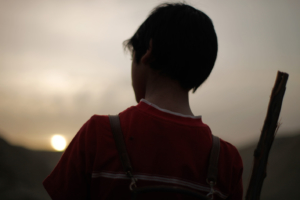
Michael Schapira is an Interviews Editor for Full Stop.
This post may contain affiliate links.





